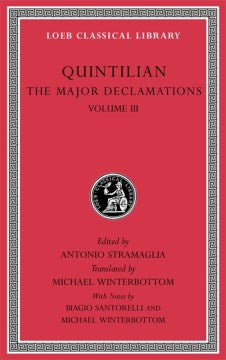
Quintilian
Publisher,Harvard Univ Pr
Publication Date,
Format, Hardcover
Weight, 340.19 g
No. of Pages, 432
A controversia is a speech purporting to be delivered on behalf of either the prosecution or the defense in an imaginary trial. Slightly simpler is the suasoria, a speech of advice addressed to a mythological or historical character on the verge of making an important decision. Learning how to compose and deliver such speeches, known collectively as declamations (Lat. declamationes, Gk. meletai), was the final stage in the traditional Greco-Roman rhetorical training, which was considered the necessary preparation for public activity throughout the Roman imperial age. Although criticized for the often far-fetched nature of its subjects, declamation remained for more than six centuries the keystone of education for any young citizen who could afford a 'high-school' training. At the same time, this school practice quickly earned the favor of a large audience of professional rhetoricians, enthusiasts, and people of average education: by the 1st century AD, public performances of fictive speeches were among the most popular events in the cultural life of the Roman empire. With its fictional universe of characters, laws, and recurring situations, declamation shaped a cultural background common to the writers and readers of the Greco-Roman world, who all shared the same--more or less standardized--rhetorical education. Among all the extant sources, the nineteen 'Major declamations' wrongly ascribed to Quintilian stand out for their contribution to our understanding of ancient declamation. They are virtually the only fully developed controversiae surviving from pre-medieval Latinity, invaluable because they show how a student was expected to handle the themes, the recurring situations and arguments, the technical rules. And what is more, they lay bare the mistakes that were often made in the process.--

